The John Locke Lectures
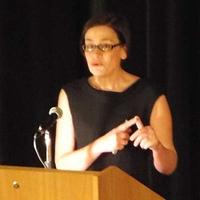
|
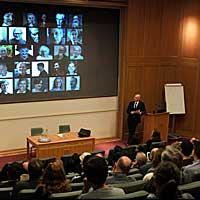
|
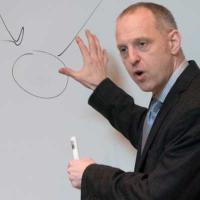
|

|
The John Locke Lectures are among the world's most distinguished lecture series in philosophy. The Lockes began in 1950, funded by a generous bequest from Henry Wilde, and this list of past lecturers demonstrates that many of the greatest philosophers since that point have visited Oxford as the Locke Lecturer.
The John Locke Lectures will not take place in 2026 and are scheduled to resume in 2027
Professor Richard Pettigrew (University of Bristol)
From a Point of View

How should we build the point of view that we take on the world—the point of view that includes our beliefs, our values, and perhaps also our attitudes to risk? And, once it is built, how should it evolve, how should we act in the light of it, and what normative weight do our actions have when they are based on a point of view built in a particular way? Those are the questions that motivate these lectures, but before we can answer them, we must ask what populates the foundations of epistemic, practical, and moral normativity. What is it that determines what we should believe, how we should form our desires, and how we should act on the basis of them? I'll present an inventory of these foundations that permits many different points of view: different beliefs even for those with the same evidence; different values and different ways of forming them; and in certain situations—rare but important ones—different attitudes to risk. This permissiveness raises a number of problems. If other beliefs are available and permissible, may I rationally switch from one to the other without anything that prompts that? When, from my current point of view, there is evidence I would rather not receive, as I now judge that it would mislead me, what should I do if I nonetheless receive that evidence without choosing to? That's all on the epistemic side. But the permissiveness of my view raises questions on the practical and moral side as well. The way you form your values determines what normative facts follow from them. When they are formed in certain ways, they cannot underpin genuine and effective consent, even if the values themselves are permissible. What are those ways, and why? What's more, we can change our desires across the course of our life, remaining at all times within the realm of the permissible. How, then, are we to choose on our own behalf, and when can a choice made by the lights of my present values and against the wishes of my future values end up counting as a moral wrong, rather than simply a prudential error?
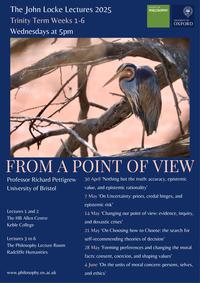
Lectures
Lecture 1: Nothing but the truth: accuracy, epistemic value, and epistemic rationality (MP3) (Handout)
Lecture 2: On Uncertainty: prios, credal hinges, and epistemic risk (MP3) (Handout)
Lecture 3: Changing our point of view: evidence, inquiry, and doxastic crises (MP3) (Handout)
Lecture 4: On Choosing how to Choose: the search for self-recommending theories of decision (MP3) (Handout)
Lecture 5: Forming preferences and changing the moral facts: consent, coercion, and shaping values (MP3) (Handout)
Lecture 6: On the units of moral concern: persons, selves, and ethics (MP3) (Handout)
The reading list for the lectures is available here.
Professor Jonardon Ganeri (University of Toronto)
Seeing in Sanskrit

In the first of my lectures I offered a fresh reading of a key early Nyāya text. My aim was to demonstrate a way of understanding the text which frees it from a gloss put on it by later interpreters, a conceptualist gloss that eventually binds it to a thesis incompatible with naïve realism or relationalism. In the second lecture I examined key Nyāya arguments for Nyāya realism, the most important of which is that amodal perception of wholes is better explained with its framework than within Buddhist representationalism. I then turned to three forms of experience that enrich the picture. The first is illusion, and my argument in the third lecture was that neither disjunctivism nor objective looks theory is more compelling than the Nyāya’s own explanation of perceptual error. This explanation draws on synaesthetic phenomena to defend the existence of anomalous relations of acquaintance with absent features. The second case is absence experience, the best noninferential theory of which concedes a role to mental imagery. Even a dogged commitment to absence realism cannot help Nyāya here. The view I defend is a non-disjunctivist version of naïve realism, one in which the relation of presentation is enriched to include both the presentation-as-present of absent features and the presentation-as-absent of absences through mismatch with mental imagery. The third case is the spectatorial experience of artworks. A sophisticated Indian analysis of such experience, as it relates to audience engagement in theatre (rasa), leads me to a threefold analysis in which the perception of an artwork incorporates elements both of virtual acquaintance and absence experience (prominent in aniconic representation). In all this my aim is to reprise Wollheim’s “two perceptual projects” hypothesis but in a different form. What replaces the distinction between seeing face-to-face and seeing-in is an orthogonal one, between what is presented-as-present and what is presented-as-absent. I focussed on the relationship between perceptual experience and attention. We have been taught by Richard Wollheim that the perceptual experience of an artwork consists in a twofold attention, and by Krishnacandra Bhattacharyya that the perceptual experience of absence consists in a negative attention (a figure-ground structure with an empty figureposition). Attention explains how we can experience wholes and why there are illusions, and I want to resist the view that what does the explanatory work is the thesis that perceptual experience is saturated by concepts and conceptualisation. So I argued that a suite of Sanskrit ideas are better understood as matters of attention rather than conceptualisation: savikalpaka-pratyakṣa (the idea of perceptual structure), avayavi-pratyakṣa (perceptual completion in the perception of whole objects), viparyaya (the idea of perceptual error and illusion), abhāva-pratyakṣa (absence perception), and finally rasa (aesthetic experience as perceptual). The key concepts I drew upon from the psychology and philosophy of attention are: the distinction between selection and access, the idea of a perceptual chunk, feature-binding, the figure-ground distinction, and simultaneous divided attention. So I argue for a non-disjunctivist version of naïve realism, inspired by the work of Bimal Matilal but extending it. In an update of the empiricist project it is to Nyāya rather than Locke that we should look.

Lectures
Lecture 1: Seeing Face-to-Face: Nyāya Realism (MP3) (Handout) (Slides)
Lecture 2: Nyāya Arguments for Nyāya Realism (MP3) (Handout) (Slides)
Lecture 3: Illusion as Mislocated Seeing (MP3) (Handout) (Slides)

Professor Jennifer Nagel (University of Toronto)
Recognizing knowledge: intuitive and reflective epistemology
Humans have a remarkable capacity to track what others do and do not know. This capacity guides us in everyday social navigation, for example as we switch between the roles of telling and asking in conversation. It also provides raw data to epistemology, in the form of intuitive judgments about possible cases of knowledge. Over the years, philosophers, psychologists, and sociologists have discovered a variety of cross-culturally robust patterns of epistemic intuition, patterns that are attractively systematic, but often disturbingly paradoxical. This series of talks examines the natural origins and functions of our capacity to detect knowledge, in search of a better analysis of the data guiding epistemology, and ultimately a clearer view of knowledge itself.
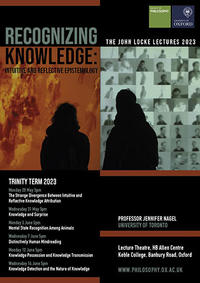
Lectures
Lecture 1: The strange divergence between intuitive and reflective knowledge attribution (MP3) (Handout)
Lecture 2: Knowledge and surprise (MP3) (Handout)
Lecture 3: Mental state recognition among animals (MP3) (Handout)
Lecture 4: Distinctively human mindreading (MP3) (Handout)
Lecture 5: Knowledge possession and knowledge transmission (MP3) (Handout)
Lecture 6: Knowledge detection and the nature of knowledge (MP3) (Handout)

Professor Susan Wolf (University of North Carolina at Chapel Hill)
Selves Like Us
Since at least the seventeenth century, philosophers have distinguished membership in the species homo sapiens from moral personhood, a category which they take to be of considerable ethical and practical significance. But there are other nonbiological features that are of ethical and practical significance as well, suggesting that there is an ethical, non-biological conception of humanity that is different from the standard philosophical understanding of moral personhood. After reflecting on the benefits and dangers of focusing attention on the idea of “the distinctively human,” the lecture explores the variety of features and capacities that distinguish “selves like us” from other animals, artificially intelligent machines, and possibly imaginary divine and extraterrestrial rational individuals.
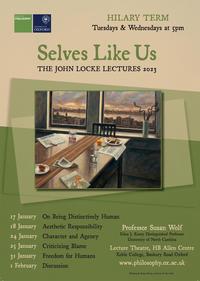
Lecture 1: On being distinctively human (MP3) (full recording on Canvas)
Lecture 2: Aesthetic Responsibility (MP3) (full recording on Canvas)
Lecture 3: Character and Agency (MP3) (full recording on Canvas)
Lecture 4: Criticizing Blame (MP3) (full recording on Canvas)
Lecture 5: Freedom for humans (MP3) (full recording on Canvas)
Full recordings are currently only available to University of Oxford members.
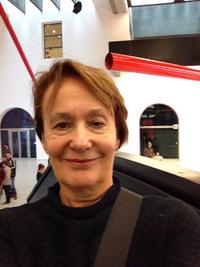
Professor Angelika Kratzer (University of Massachusetts Amherst)
Reports of what we say, know, or believe
Attitude ascriptions and speech reports are a litmus test for any semantic theory. They were at the center of discussion when philosophers and logicians became interested in natural language and began to develop the semantic frameworks we are relying on today. Mastery of attitude ascriptions and speech reports is a milestone in the cognitive development of a child and the human species as a whole.
Attitude and speech reports are built from smaller building blocks that combine and recombine to produce the interpretations those reports have. My lectures will be a search for those building blocks and for clues about how they might interact with each other. The goal – like that of any semantic theory – is a typology where the combinatorics of building blocks generates the range of possible interpretations of the constructions we are trying to understand.
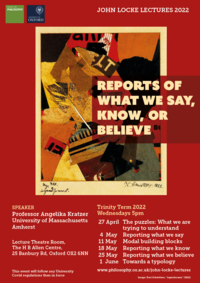
Lecture 1 'The puzzles: What we are trying to understand'
Lecture 2 'Reporting what we say'
Lecture 3 'Modal building blocks'
Lecture 4 'Reporting what we know'
Lecture 5 'Reporting what we believe'
Lecture 6 'Towards a typology'
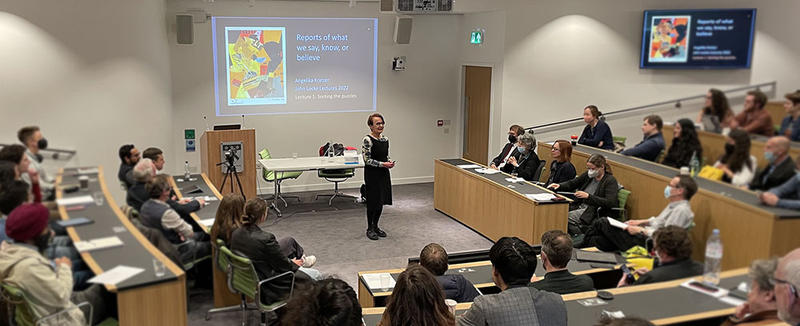
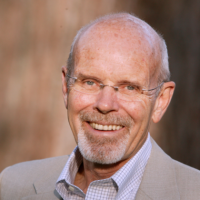
Professor Philip Pettit (Princeton and ANU)
Minds That Speak
The theme of the lectures is the constitutive dependence of our characteristic mental capacities on the ability to speak and the social life it makes possible. The claim defended is that speaking ensures that minded subjects have these capacities. The method followed is to explore, counterfactually, how the advent of even a simple, information-sharing language would elicit the capacities in subjects otherwise like us.
Minds that speak, so the argument goes, will more or less inevitably:
1. Decide about how to judge and what to think;
2. Control their thinking by rule-based reasoning;
3. Enjoy a special perceptual consciousness;
4. Make commitments and form community;
5. Constitute persons and selves;
6. Assume responsibility for what they do; and, a topic for another occasion;
7. Command one another’s respect.
Is speech necessary for the capacities it is said to ensure? Perhaps not in the case of the first three, more purely psychological abilities; almost certainly, in the case of the other capacities, which have a social-psychological character.
Philip Pettit is L.S. Rockefeller University Professor of Politics and Human Values at Princeton University and Distinguished University Professor of Philosophy at the Australian National University, Canberra
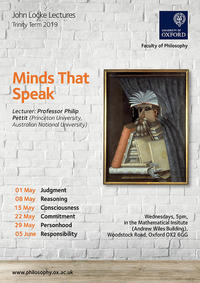
Lecture 1 (Wednesday 1 May 2019) 'Judgement' - (MP3) (Handout).
Lecture 2 (Wednesday 8 May 2019) 'Reasoning' - (MP3) (Handout)
Lecture 3 (Wednesday 15 May 2019) 'Consciousness' - (MP3) (Handout)
Lecture 4 (Wednesday 22 May 2019) 'Commitment' - (MP3) (Handout)
Lecture 5 (Wednesday 29 May 2019) 'Personhood' - (MP3) (Handout)
Lecture 6 (Wednesday 5 June 2019) 'Responsibility' - (MP3) (Handout)
Lecture abstracts can be viewed here Minds that Speak.
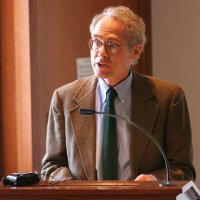
Professor Peter Railton (University of Michigan)
'Learning and Doing: Toward a Unified Account of Rationality in Belief, Desire and Action'
Abstract: We can think of rationality both narrowly and broadly. In the narrow sense, rationality is about proper reasoning, and about thinking or acting in accord with such reasoning. In the broad sense, rationality is about reasons-responsiveness, which incorporates a wider array of capacities that enable us to respond aptly to reasons—in perception, belief, inference, motivation, and action. Even narrow rationality ineliminably involves attitudes and dispositions that cannot themselves be exercises of reasoning, on pain of regress. But how, if not by reasoning, can such attitudes and dispositions become well-attuned or sensitive to reasons?—A question posed by, among others, Aristotle, Hume, and Kant.
Each of these figures took seriously the idea that ‘What I can’t build, I don’t understand’, and sought to ‘build’ accounts of desire, belief, or action that permitted us to see rationality in the broad sense at work—even in reasoning. We will proceed likewise, taking advantage of recent work in both philosophy and psychology to move the project forward and increase its descriptive (and potentially explanatory) depth. This in turn can help us make progress in large-scale debates in philosophy that often depend upon conceptions of desire, belief, and action—e.g., disputes over the nature of normative judgment and the possibility of realism in the normative domain. On these questions, I will be using the account developed of desire, belief, and action to defend cognitivism and realism, and, at the end, to respond to recent criticisms of moral cognitivism and realism on psychological, neuroscientific, and evolutionary grounds—the weight of the evidence, I suggest, lies on the vindicative rather than debunking side of these debates.
Peter Railton is Gregory S. Kavka Distinguished University Professor and John Stephenson Perrin Professor of Philosophy at the University of Michigan, Ann Arbor.
Lecture 1: (2 May) Desire, value, and learning [MP3] [Slides]
Lecture 2: (9 May) Belief, affect, and reliance [MP3] [Slides]
Lecture 3: (16 May) Intelligent action without regress [MP3] [Slides]
Lecture 4: (23 May) Skill in guidance by norms and values [MP3] [Slides]
Lecture 5: (30 May) Moral intuition, moral judgment, and moral agency [MP3] [Slides]
Lecture 6: (6 June) Moral learning, moral evolution, and moral realism [MP3] [Slides]
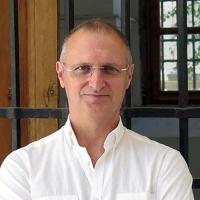
Professor Michael Smith (Princeton University)
'A Standard of Judgement'
“Here is the beginning of philosophy: a recognition of the conflicts between men, a search for their cause, a condemnation of mere opinion…and the discovery of a standard of judgment.”–Epictetus, Discourses, II:11
Abstract
How much can we learn from the armchair? The answer turns out to be quite a lot. The aim is to show how it is possible for us to know, from the armchair, that we are agents in a spatio-temporal world that may well contain other agents; that there are things that we ought to do simply in virtue of being agents; that many of these things correspond to what we ordinarily take to be moral requirements; that there may well be other things we ought to do that correspond to what we ordinarily take to be requirements of love and friendship, and that these nearly always have, but are not exhausted by, a moral dimension; and that there may well be yet other things still that we ought to do that express the interests we have in art objects and aspects of nature. When we leave the armchair and remind ourselves that we are embodied human beings who live among others in a complex physical and social world, we further discover that we are typically subject to all of these requirements, and we also discover, disappointingly, that we have a limited capacity to act in accordance with them. This sets the scene for a number of practical problems. We solve some of these problems by developing and exercising our capacity for self-control, and we solve others by cooperating with other agents to develop and implement formal and informal ways of regulating our interactions with each other and with the non-agential parts of the world.

Lecture 1 (Wednesday 26 April 2017) 'From the human condition to a standard of judgement' [MP3] [Slides]
Lecture 2 (Wednesday 3 May 2017) 'From a standard of judgement to moral rationalism' [MP3] [Slides]
Lecture 3 (Wednesday 10 May 2017) 'The best form of moral rationalism' [MP3] [Slides]
Lecture 4 (Wednesday 17 May 2017) 'Moral reasons vs non-moral reasons' [MP3] [Slides]
Lecture 5 (Wednesday 24 May 2017) 'A normative theory of blame' [MP3] [Slides]
Lecture 6 (Wednesday 31 May 2017) 'Loose ends' [MP3] [Slides]
Bonus discussion session (Thursday 8 June 2017) Defeat by nature in “Force Majeure” (following viewing of film on Weds 7 June, same venue)

Professor Ted Sider (Rutgers University)
'The Tools of Metaphysics and the Metaphysics of Science'
The Faculty of Philosophy at the University of Oxford was pleased to announce the 2016 John Locke Lectures, given by Professor Ted Sider. The lectures took place at 5pm on Wednesdays in weeks 3 to 8 of Trinity Term, or 11th May to 15th June inclusive, and were given at the T S Eliot Lecture Theatre, Merton College, Oxford.
Abstract
First-order metaphysical questions are sensitive to a second-order question, that of the appropriate concepts for framing first-order questions. It makes a big difference whether one views metaphysics through a modal lens, or through the lens of conceptual analysis, or through the lens of ground. These lectures will examine how the recent shift to concepts of fundamentality and ground affect a range of issues in the metaphysics of science, in particular “structuralist” positions: causal/nomic/dispositional essentialism, relationalism about quantities, mathematical structuralism, structural realism, qualitativism.
Lecture 1 (11th May - Week 3) 'Conceptual tools in metaphysics' [Lecture Notes]
Lecture 2 (18th May - Week 4) 'Properties and laws' [MP3]
Lecture 3 (25th May - Week 5) 'Quantitative properties' [MP3]
Lecture 4 (1st June - Week 6) 'Individuals and structure' [MP3]
Lecture 5 (8th June - Week 7) 'Individuals and structure' (continued) [MP3]
Lecture 6 (15th June - Week 8) 'Theoretical equivalence' [MP3]

Professor Rae Langton (Cambridge)
'Accommodating Injustice'
The Faculty of Philosophy at the University of Oxford is pleased to announce the 2015 John Locke Lectures, to be given by Professor Rae Langton. The lectures will take place at 5pm on Wednesdays in weeks 1 to 6 of Trinity Term, or 29th April to 3rd June inclusive, and will be given at the Grove Auditorium in Magdalen College, Oxford. (Please note: admissions to the Auditorium will be strictly limited to the seating capacity, without exception.) There will be a drinks reception after the first lecture.
Abstract
What we do with words can help or hinder justice in ways that exploit rules of accommodation: a process of adjustment that tends to make speech acts count as 'correct play'. Accommodation can enable speakers and hearers to build unjust norms and distributions of authority, sexual subordination, and racial hatred. Of special interest are ‘back-door’ speech acts, which work in subtle ways via presupposition and its relatives, generics, or thick concepts and epithets. Accommodation can undermine knowledge, by disguising injustice, altering standards and stakes, and destroying credibility. In placing limits on ‘correct play’, it can silence.
Attending to these dangers makes visible certain solutions. Accommodation reveals speech acts as something we do together with words: the acts and omissions of hearers, as well as speakers, contribute to what is done. Free speech itself looks different, demanding richer resources: state and individual action, not just inaction, could be needed to make it real.
Lecture 1 (29th April) 'Accommodating Authority' [Handout] [MP3]
Lecture 2 (6th May) 'Accommodating Norms' [Handout] [MP3]
Lecture 3 (13th May) 'Accommodating Knowledge' [Handout] [MP3]
Lecture 4 (20th May) 'Silence as Accommodation Failure' [Handout] [MP3]
Lecture 5 (27th May) 'Accommodating Attitudes' [Handout] [MP3]
Lecture 6 (3rd June) 'How to undo things with words' [Handout] [MP3]

Professor Martha Nussbaum (University of Chicago)
'Anger and Forgiveness'
The 2014 John Locke Lecture series were held at 5 p.m. on Wednesdays in weeks 2 to 6 of Trinity Term 2014. The lectures were given at the Grove Auditorium, Magdalen College.
In addition to the lectures, there were two discussion seminars, in the Seminar Room at the Radcliffe Humanities Building (Woodstock Road, Oxford OX2 6GG). The first seminar was on 19 May, from 2pm to 5pm, and at this seminar chapters 2 and 3 of the manuscript (see below) were discussed. The second seminar was on 2 June, from 3pm to 6pm. The first half of that seminar was on chapters 4 and 5; the second half, on chapters 6 and 7.
Abstracts
Lecture 1 (7th May) 'Furies into Eumenides'
Anger is not just ubiquitous, it is also popular – even among philosophers. Many people think it is impossible to care sufficiently for justice without anger at injustice. Many also believe that it is impossible for individuals to vindicate their own self-respect adequately without anger. These lectures will argue that anger is conceptually confused and normatively pernicious. It is neither normatively appropriate nor productive in either the personal or the political life. The first lecture introduces the core ideas, using as a metaphor the end of Aeschylus’ Oresteia, in which goddesses of retribution are transformed into guardians of social welfare. It also introduces a sub-argument concerning forgiveness: rather than being the normatively benign alternative to anger that many people believe it to be, forgiveness (at least as standardly defined) all too often proves a covert form of anger, extracting humiliation as a condition of forgoing angry attitudes.
Lecture 2 (14th May) 'Anger: Down-ranking, Weakness, Payback'
This lecture (a very short form of the chapter 2 available on the website) analyzes the cognitive content of anger, starting from, but not totally agreeing with, Aristotle’s definition. With the help of an example, I argue that anger is almost always normatively flawed in one of two ways. Either it wrongly supposes that punishing the aggressor could make good a past damage – an idea of cosmic balance with deep roots in the human psyche but nonsensical – or, in the case where the angry person focuses exclusively on offense to relative status, it may make sense (a relative lowering of the offender does effect a relative raising of the victim), but the exclusive focus on status is normatively problematic. Although anger may still be useful as a signal, a motivation, and/or a deterrent, its flaws compromise even this instrumental role. I then discuss a concept that I call the Transition: a constructive segue from backward-looking anger to constructive thought about the future. And I identify one species of anger that I do consider normatively unproblematic, which I call Transition-Anger. I also discuss the connection between anger and a displaced sense of helplessness, and examine a possible role for empathy in extricating oneself from the trap of anger.
Lecture 3 (21st May) 'Anger in the Personal Realm'
It is commonly thought that people who have been wronged by intimates ought to be angry, because they owe it to their self-respect so to react. This lecture (a very short form of chapter 4 on the website) contests that claim, discussing anger between intimate partners and anger between adult children and their parents (but focusing on the latter for reasons of time). I end with a discussion of self-anger. In all cases I pursue my sub-theme of forgiveness, arguing that generosity, and not the extraction of apologies, Is what we need.
Lecture 4 (28th May) 'The Political Realm: Everyday Justice'
Many people think that the institutions of the legal system ought to embody the spirit of (justified) anger, and they defend a picture of criminal punishment along these lines. In keeping with the forward-looking and constructive attitude I have defended previously, I criticized criminal law retributivism and defend a Millean (not exactly Benthamite) form of welfarism, looking at the implications of these ideas for several specific aspects of the criminal justice system (victim impact statements, shame-based penalties, juvenile justice conferencing, mercy at the sentencing phase). I insist, however, that the ex post focus of the criminal justice system is actually a narrow part of the task of a good society in dealing with crime. Forward-looking strategies should focus above all on education, health care, nutrition, and inclusion in the political process. (This lecture is a short form of chapter 6 on the website.)
Lecture 5 (4th June) 'The Political Realm: Revolutionary Justice'
When there is great injustice, it is very tempting to think that righteous anger is the best response, and even a necessary response. On the other hand, it is noteworthy that the three most successful revolutionary freedom movements in the past century have been conducted in a spirit of non-anger (distinct from, though sometimes joined to, non-violence): Gandhi’s independence movement, Martin Luther King, Jr.’s role in the U. S. civil rights movement, and Nelson Mandela’s freedom movement in South Africa. Studying the thought and practice of these three leaders, I argue that non-anger is both normatively and practically superior to anger. (This lecture is a short form of chapter 7 from the website.)
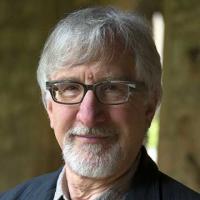
Professor Ned Block (NYU)
'Attention and Perception'
Abstract
How philosophical issues about perception are transformed in the light of the science of perception
Does conscious perception have representational content? Or are the representations involved in perception all sub-personal underpinnings of perception rather than partly constitutive of perception itself? Is “unconscious perception” really
perception? Is seeing always seeing-as? Is seeing-as always conceptual? Do we see things only as having colors, shapes and textures? Or do we see things as being CD players or baseball bats? Is perception a form of judgment?
Must conscious perception be cognitively accessible to the subject? Is attention required for object perception or knowledge of the reference of perceptual demonstratives? These lectures argue that these and other related philosophical issues
are transformed by taking into account the science of perception.
The 2013 John Locke Lecture series were held at 5 p.m. on Wednesdays in weeks 2 to 7 of Trinity Term 2013. The lectures were given at the T. S. Eliot Lecture Theatre, Merton College (enter by Rose Lane).
Lecture 1 (1st May) 'Attention, representationism and direct realism'
Facts about attention and its relation to the phenomenology of perception are problematic for the major philosophical approaches to perception.
Lecture 2 (8th May) 'The grain of seeing vs attending and the de re thought condition on seeing an object'
There is a minimal resolution of object-seeing that is finer than a corresponding minimal resolution of object-attention, so object-attention is not required for object-seeing. No reasonable version of a de re thought potential requirement on seeing
conflicts with this grain difference. These ideas solve a version of the speckled hen problem.
Lecture 3 (15th May) 'Seeing-As: How can we find out whether seeing is representational, and if so, what representations are involved?'
Some say that seeing is always seeing-as and that seeing-as involves conceptualization. Some say that not only can we see things as having certain colors, shapes and textures; we can see things as being a table or a car. A framework is proposed
for distinguishing high level perceptual representations from recognitionally equivalent color, shape and texture representations, and for distinguishing perceptual representations from cognitive representations.
Lecture 4 (22nd May) 'Consciousness and cognition: the power of unconscious perception'
One of the most important issues concerning the foundations of conscious perception centers on the question of whether perceptual consciousness is rich or sparse. The “overflow” argument uses a form of “iconic memory” to argue that perceptual consciousness
is richer (i.e., has a higher capacity) than cognitive access: when observing a complex scene we are conscious of more than it is possible to report or think about. Recently, the overflow argument has been challenged both empirically and conceptually.
This lecture reviews the controversy, focusing on the power of unconscious processes and arguing that what we know about unconscious processing suggests that consciousness does overflow cognition.
Lecture 5 (29th May) 'Conscious, preconscious, unconscious'
There are reliably reproducible states that have little or no reportability but do not have many of the signature properties of unconscious states. This lecture discusses whether these states might be phenomenally conscious in the light of the close
conceptual tie between conscious perception and first person authority.
Lecture 6 (5th June) 'Does the physical basis of consciousness include anything outside the head?'
Clark and Chalmers famously argued that the cognitive mind extends beyond the brain into the body and the world. If I can fluidly access the phone number from a suitable source outside my body, we should allow that I know it now. Others have
argued that this “vehicle externalist” point of view applies to consciousness: the minimal constitutive supervenience base of conscious experience extends outside the brain into the rest of the body and into the world. This lecture argues that
there is an established empirical framework for resolving such issues and we have overwhelming grounds to doubt the externalist point of view applied to consciousness.
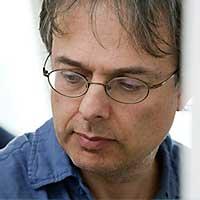
Professor Stephen Yablo (MIT)
'Truth and Content'
Abstract
“Aboutness” is a grand-sounding name for something basically familiar. Books are on topics; portraits are of people; the 1812 Overture concerns the Battle of Borodino. Aboutness is the relation that meaningful items bear to whatever it is that they are on, or of, or that they address or concern.
Brentano made aboutness the defining feature of the mental. Phenomenologists have studied the aboutness-features of particular mental states. Materialists have sought to ground it in teleology or natural regularities. Attempts have even been made, in library science and the theory of information, to operationalize aboutness.
Brentano made aboutness the defining feature of the mental. Phenomenologists have studied the aboutness-features of particular mental states. Materialists have sought to ground it in teleology or natural regularities. Attempts have even been made, in library science and the theory of information, to operationalize aboutness.
And yet the notion plays no serious role in philosophical semantics. This is surprising — sentences have aboutness properties, if anything does. One leading theory gives the meaning of a sentence by listing the scenarios in which it is true, or false. Nothing is said about the principle of selection, about how and why the sentence would be true, or false, in those scenarios. Subject matter is the missing link here. A sentence is true because of how matters stand where its subject matter is concerned.
I will be asking, first, how we might go about making subject matter a separate factor in sentence meaning/content, and second, what “directed contents” can do for us in other parts of philosophy.
The 2012 John Locke Lecture series was held at 5 p.m. on Wednesdays in weeks 2 to 6 of Trinity Term 2012. The lectures were given at the T. S. Eliot Lecture Theatre, Merton College.
Lecture 1 (2nd May) 'Semantic Excuses' [Handout] [MP3]
Lecture 2 (9th May) 'The Truth and Something But the Truth' [Handout] [MP3]
Lecture 3 (16th May) 'Extrapolation and its Limits' [Handout] [MP3]
Lecture 4 (23rd May) 'Knowing About Things' [Handout] [MP3]
Lecture 5 (30th May) 'Saying Things: Pretense and Presupposition' [Handout] [MP3]
Professor John Cooper (Princeton)
'Ancient Greek Philosophies as a Way of Life'
Abstract
Philosophy is a demanding intellectual discipline, with many facets: logic, epistemology, philosophy of nature and science, metaphysics, ethics, political philosophy, philosophy of art, rhetoric, philosophy of language and mind. But a long tradition of ancient Greek philosophers, beginning with Socrates, made their philosophies also complete ways of life. For them reason, perfected by philosophy—not religion, not cultural traditions and practices—constitutes the only legitimate authority for determining how one ought to live. They also thought philosophically informed reason should be the basis for all our practical attitudes, all our decisions, and in fact the whole of our lives. In these lectures we examine the development of this pagan tradition in philosophy, from its establishment by Socrates, through Plato and Aristotle, the Stoics, Epicurus, the Pyrrhonian Skeptics, and Plotinus and late ancient Platonism.
The 2011 John Locke Lecture series was held at 5 p.m. on Wednesdays in weeks 1 to 6 of Trinity Term 2011. The lectures were given at the Gulbenkian Lecture Theatre, St Cross Building, Manor Road. The classes took place at the Faculty of Philosophy, 10 Merton Street.
Lecture 1 (4th May): 'Philosophy in Antiquity as a Way of Life' [Handout] [MP3]
Lecture 2 (11th May): 'Aristotle's Philosophy as Two Ways of Life' [MP3]
Class/Seminar (18th May): 'The Epicurean and Pyrrhonian Ways of Life' (Texts and Discussion).
Lecture 3 (25th May): 'The Stoic Way of Life' [Handout] [MP3]
Lecture 4 (1st June): 'Platonism as a Way of Life' [Handout] [MP3]
Class/Seminar (8th June): 'Plotinus on the Human Person and the Virtues' (Texts and Discussion)
Professor David Chalmers (ANU)
'Constructing the World'
Abstract
In Der Logische Aufbau Der Welt, Carnap argued that all truths are definitionally entailed by a very limited class of truths. Most philosophers think that the project of the Aufbau is a failure and that nothing like it can succeed. I will investigate the prospects for an Aufbau-like project, centering around what I call the Scrutability Thesis: all truths are a priori entailed by a very limited class of truths. I will also discuss applications to Carnapian projects in epistemology, the philosophy of language and mind, metaphysics, the philosophy of science, and metaphilosophy.
The lectures took place on Wednesdays, Weeks 2 to 7, of Trinity Term 2010. They started at 5pm, and took place at the Gulbenkian Theatre, St Cross Building, Manor Road.
Lecture 1 (5th May): A Scrutable World [Handout] [MP3] [Slides]
Lecture 2 (12th May): The Cosmoscope Argument [Handout] [MP3] [Slides]
Lecture 3 (19th May): The Case for A Priori Scrutability [Handout] [MP3] [ Slides]
Lecture 4 (26th May): Revisability and Conceptual Change: Carnap vs. Quine [Handout] [MP3] (No slides were used)
Lecture 5 (2nd June): Hard Cases: Mathematics, Normativity, Ontology, Intentionality [Handout] [MP3] [Slides]
Lecture 6 (9th June): Whither the Aufbau? [Handout] [MP3] [Slides]
The book manuscript can be found at http://consc.net
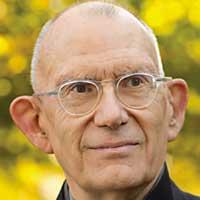
Professor Thomas M. Scanlon (Harvard)
'Being Realistic about Reasons'
Abstract
The idea that there are irreducibly normative truths about reasons for action, which we can discover by thinking carefully about reasons in the usual way, has been thought to be subject to three kinds of objections: metaphysical, epistemological, and motivational or, as I would prefer to say, practical. Metaphysical objections claim that a belief in irreducibly normative truths would commit us to facts or entities that would be metaphysically odd—incompatible, it is sometimes said, with a scientific view of the world. Epistemological objections maintain that if there were such truths we would have not way of knowing what they are: we could “get in touch with” them only through some strange kind of intuition. Practical objections maintain that if conclusions about what we have reason to do were simply beliefs in a kind of fact, they could not have the practical significance that reasons are commonly supposed to have. This is often put by saying that beliefs alone cannot motivate an agent to act, but it is better put as the claim that beliefs cannot explain action, or make acting rational or irrational in the way that accepting conclusions about reasons is normally thought to do.
I will argue that all of these objections are mistaken. The idea that there are truths about are reasons for action does face serious problems. But these are normative problems—problems internal to the normative domain, whose solutions, if there are such, must themselves be normative.
The lectures took place on Wednesdays, Weeks 1 to 5, of Trinity Term 2009. They started at 5pm, and took place at the Gulbenkian Theatre, St Cross Building, Manor Road.
Lecture 1: Introduction (MP3) / (Text - PDF file)
Lecture 2: Normativity and Metaphysics (MP3) / (Text - PDF file)
Lecture 3: Motivation and the Appeal of Expressivism (MP3) / (Text - PDF file)
Lecture 4: Epistemological Problems (MP3) / (Text - PDF file)
Lecture 5: Normative Structure (MP3) / (Text - PDF file)
Professor Hartry Field (NYU)
‘Logic, Normativity, and Rational Revisability’
Wednesdays at 5pm, Weeks One to Six (23rd April to 28th May 2008) was held in the Gulbenkian Lecture Theatre, St Cross Building, Manor Road, Oxford
(n.b., the Lecture in Fifth Week (21 May) took place in Lecture Theatre II of the St Cross Building, not the Gulbenkian Lecture Theatre)
| Wednesday 23rd April 2008 - Lecture 1 (PDF) | (MP3 - 28.8Mb) |
| Wednesday 30th April 2008 - Lecture 2 (PDF) | (MP3 - 31.9Mb) |
| Wednesday 7th May 2008 - Lecture 3 (PDF) | (MP3 - 27.7Mb) |
|
Wednesday 14th May 2008 - Lecture 4 (PDF) |
(MP3 - 27.0Mb) |
| Wednesday 21st May 2008 - Lecture 5 (PDF) | (MP3 - 30.3Mb) |
| Wednesday 28th May 2008 - Lecture 6 (PDF) | (MP3 - 26.5Mb) |
Professor Hartry Field (NYU)
‘Logic, Normativity, and Rational Revisability’
Wednesdays at 5pm, Weeks One to Six (23rd April to 28th May 2008) was held in the Gulbenkian Lecture Theatre, St Cross Building, Manor Road, Oxford
(n.b., the Lecture in Fifth Week (21 May) took place in Lecture Theatre II of the St Cross Building, not the Gulbenkian Lecture Theatre)
| Wednesday 23rd April 2008 - Lecture 1 (PDF) | (MP3 - 28.8Mb) |
| Wednesday 30th April 2008 - Lecture 2 (PDF) | (MP3 - 31.9Mb) |
| Wednesday 7th May 2008 - Lecture 3 (PDF) | (MP3 - 27.7Mb) |
|
Wednesday 14th May 2008 - Lecture 4 (PDF) |
(MP3 - 27.0Mb) |
| Wednesday 21st May 2008 - Lecture 5 (PDF) | (MP3 - 30.3Mb) |
| Wednesday 28th May 2008 - Lecture 6 (PDF) | (MP3 - 26.5Mb) |
Professor Robert Stalnaker (MIT)
'Our knowledge of the internal world'
| Starting in the middle | abstract (PDF) | handout(PDF) | lecture(MP3) |
| Lecture 2 (Wednesday 9th May): Epistemic possibilities and the knowledge argument |
abstract (PDF) | handout(PDF) | lecture(MP3) |
| Lecture 3 (Wednesday 16th May): Locating ourselves in the world |
abstract (PDF) | handout(PDF) | lecture(MP3) |
| Lecture 4 (Wednesday 23rd May): Phenomenal and epistemic indistinguishability |
abstract (PDF) | handout(PDF) | lecture(MP3) |
| Lecture 5 (Wednesday 30th May): Acquaintance and essence |
abstract (PDF) | handout(PDF) | lecture(MP3) |
| Lecture 6 (Wednesday 6th June): Knowing what we are thinking |
abstract (PDF) | handout(PDF) | lecture(MP3) |
Professor Robert Brandom (Pittsburgh)
'Between Saying and Doing: Towards an Analytic Pragmatism'
|
Lecture 1 - Week 2 (3 May): “Extending the Project of Analysis” |
Handout(PDF) |
Text (PDF) |
|
Lecture 2 - Week 3 (10 May): “Elaborating Abilities: The Expressive Role of Logic” |
Handout(PDF) |
Text (PDF) |
|
Lecture 3 - Week 4 (17 May): “Artificial Intelligence and Analytic Pragmatism” |
Handout(PDF) | Text (PDF) |
|
Lecture 4 - Week 5 (24 May):“Modality and Normativity: From Hume and Quine to Kant and Sellars” |
Handout(PDF) | Text (PDF) |
|
Lecture 5 - Week 6 (31 May): “Incompatibility, Modal Semantics, and Intrinsic Logic” |
Handout(PDF) | Text (PDF) |
|
Lecture 6 - Week 7 (7 June): “Intentionality as a Pragmatically Mediated Semantic Relation” |
Handout(PDF) | Text (PDF) |
Professor Ernest Sosa (Brown University and Rutgers University)
'Apt Belief and Reflective Knowledge'
Lecture 1 Dreams and the Cogito
Lecture 2 A Virtue Epistemology
Lecture 3 Intuitions
Lecture 4 Epistemic Normativity
Lecture 5 Virtue, Luck, and Credit
Lecture 6 Circularity and Easy Knowledge
Professor J. Barnes (Paris-Sorbonne University)
'Truth, etc. Some Topics in Ancient Logic'
Lecture 1 Truth
Lecture 2 Predicates and Subjects
Lecture 3 What is a Connector?
Lecture 4 Forms of Argument
Lecture 5 How to Justify Deduction
Lecture 6 What is the Point of Logic?
Professor K. Fine (New York University)
'Reference, Relation and Meaning'
Lecture 1 Variables
Lecture 2 Frege's Puzzle
Lecture 3 Names
Lecture 4 Kripke's Puzzle
Lecture 5 Belief
Lecture 6 Moore's Paradox of Analysis
Christine Korsgaard (Harvard)
'Self-constitution: Action, Identity and Integrity'
| Lecture 1 | The Metaphysics of Normativity |
| Lecture 2 | Practical Reason and the Unity of the Will |
| Lecture 3 | Practical Reason and the Unity of the Will |
| Lecture 4 | The Transition to Humanity |
| Lecture 5 | The Transition to Humanity |
| Lecture 6 | Integrity and Interaction |
| 2000-01 (TT 01) | Bas van Fraassen Princeton |
Structure and Perspective: An Empiricist View |
| 1997-98 (TT 98) | Lawrence Sklar University of Michigan |
Philosophy within Science |
| 1996-97 (TT 97) | Robert Nozick Harvard |
Invariance and Objectivity |
| 1996-97 (MT 96) | Jerry Fodor Rutgers University |
Concepts: Where Cognitive Science Went Wrong |
| 1994-95 (TT 95) | Frank Jackson Australian National University |
Supervenience, Metaphysics, and Analysis |
| 1992-93 (TT 93) | Tyler Burge UCLA |
Sources and Resources of Reason |
| 1991-92 (TT 92) | Jonathan Bennett Syracuse University, NY |
Judging Behaviour: Analysis in Moral Theory |
| 1990-91 (TT 91) | John McDowell University of Pittsburgh |
Mind and World |
| 1989-90 (HT 90) | Thomas Nagel New York University |
Equality and Plurality |
| 1988-89 | Professor Ernst Tugendhat University of Berlin |
Withdrew due to illness |
| 1986-87 | Barry G. Stroud University of California, Berkeley |
The Quest for Reality |
| 1983-84 | David Lewis Princeton University |
On the Plurality of Worlds |
| 1982-83 | Daniel C. Dennett Tufts University, MA |
The Varieties of Free Will Worth Wanting |
| 1979-80 | David B. Kaplan UCLA |
This and D That: A History of Demonstratives (postponed) |
| 1978-79 | Professor H.P. Grice University of California, Berkeley |
Aspects of Reason |
| 1975-76 | Hilary W. Putnam Harvard University |
Meaning and Knowledge |
| 1974-75 | Professor R.B. Brandt University of Michigan |
Psychology and the Criticism of Desires and Morality |
| 1973-74 | Saul Kripke Rockefeller University, NY |
Reference and Existence (Lectures published in 2013 as Reference and Existence: The John Locke Lectures) |
| 1971-72 | Sydney S. Shoemaker Cornell University |
Mind, Body and Behaviour |
| 1969-70 | Donald Davidson Princeton University |
The Structure of Truth |
| 1968-69 | Noam Chomsky M.I.T. |
Language and the Study of Mind |
| 1967-68 | Paul Lorenzen University of Erlangen |
Non-Empirical Truths |
| 1965-66 | Wilfrid S. Sellars University of Pittsburgh |
Science & Metaphysics: Some Variations on Kantian Themes |
| 1963-64 | Jaakko Hintikka University of Helsinki |
Some Main Problems in the Philosophy of Logic |
| 1961-62 | Nelson Goodman University of Pennsylvania |
Languages of Art |
| 1959-60 | Gregory Vlastos Princeton University |
Mysticism & Logic in Heraclitus, Parmenides and Plato |
| 1957-58 | A.C. Jackson University of Melbourne |
Material Things |
| 1955-56 | A.N. Prior Canterbury University College, NZ |
Time and Modality |
| 1954-55 | Hao Wang Harvard University |
On Formalizing Mathematical Concepts |
| 1950-51 | Oets Kolk Bouwsma University of Nebraska |
The Flux |




